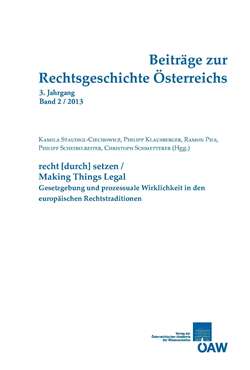
Beiträge zur Rechtsgeschichte Österreichs 2 / 2013, pp. 413-422, 2014/01/30
recht [durch] setzen - Making Things Legal.
Gesetzgebung und prozessuale Wirklichkeit in den europäischen Rechtstraditionen

In the beginning of the 19th century, when the Latin and South American former colonies started their struggle for independence, the European world all of the sudden found itself in the very delicate situation, having to decide how to legally deal with new up-raising entities, which were in fact already independent states but officially still part of the mother land. The European position on the „South American issue“ – as it was called – had from 1815 on been subject to many conferences hosted by the powers of the Holy Alliance. Between 1815 and 1823, for which period the Germans have invented the term „Kongressdiplomatie“, it became clear that there was no such thing as an European position on the „South American issue“ and that the Holy Alliances` attitude towards South America could not have been more diverse: While Great Britain and France, in their capacity of colonial and imperial powers acted in favour of the recognition of the newly established independent states, Austria, Russia and Prussia officially opposed to the recognition of states, which had been craeted as a result of a revolution. Consequently, Brazil, the only monarchy in South America by that time, remained the one and only South American state officially recognised as a sovereign and independent country by Austria up to the year 1842.